General curator of things that create dopamine. It makes me happy, and if it brings someone else joy, all the better.
Last active 4 hours ago
Don't wanna be here? Send us removal request.
Text
Writing the smut I want to see in the world and I can't be the only degenerate who would be interested in this.
Smut features in Chapter 2:
Warnings: Shameless self-indulgence, negotiated (and enthusiastic) scene, light BDSM, very light impact play, D/s dynamic, Soul sex, crying during (non traditional) sex due to Feelings™, and the author is very out of practice writing, writing smut, and D/s dynamics - the real warning here. Let me know if I missed any warnings or if there are any errors. Note: Going with masc terms with this as Nox would probably not have a strong association that way given his superiors were all ladies, I doubt Asgore lets him be too formal, Rowan is non-binary anyway, and that's just how I roll.
Inspired by this amazing piece of art:
and, of course, the incredible popatochisp:
(seriously, anything she's written with Swapfell Sans is *chefs kiss*).
#how the fuck do i tag this#that's a legitimate tag#swapfell sans#swapfell#bonely hearts club nox#bhc nox#bonely hearts club#spicy bonely hearts club#self indulgent smut#smut#undertale au
2 notes
·
View notes
Text
Clearly, they just hadn't found the right recipients yet. Bet this would get a lot of mileage at the BHC house!

#undertale#bonely hearts club#swapfell papyrus#fellswap papyrus#underfell sans#swap sans#sans undertale#horror sans
13 notes
·
View notes
Text
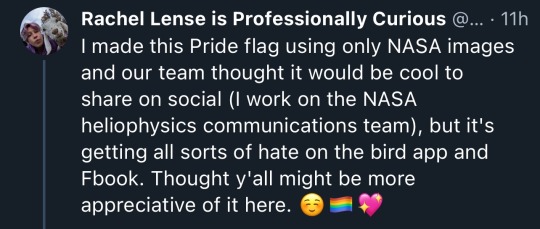
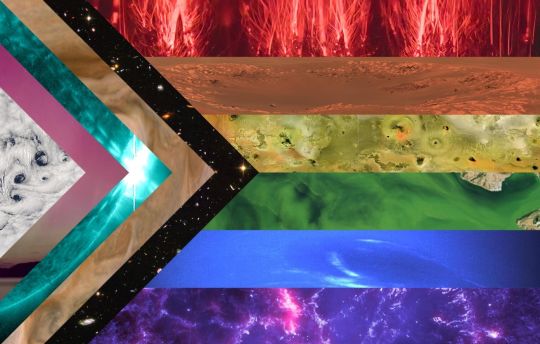
Above image is a pride flag with every color band represented by a NASA image. White is Earth clouds, pink is aurora, blue is the Sun in a specific wavelength, brown is Jupiter clouds, black is the Hubble deep field, red is the top of sprites, orange is a Mars crater, yellow is the surface of Io, green is a lake with algae, blue is Neptune, and purple is the Crab Nebula in a specific wavelength.
173K notes
·
View notes
Text
Wait what's a buildings fire evacuation plan if you aren't supposed to use the elevator to get down
275K notes
·
View notes
Text
Heya guys👋
More of my au stuff, but it's not adobe sans 🤔 this one seemed old school and sticked to tradition
Grillby, with a flavour of fine art joins the au‼️
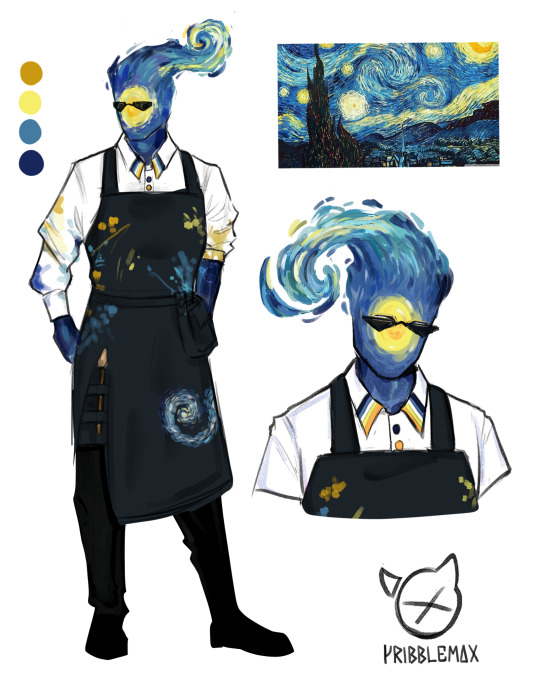
Based off the well known painting and it's painter, Starry Night by Vincent Van Gogh, I thought I could add him in as he was my second favourite in undertale after all ^^
Moving on, this Grillby works as an art supplier! Sometimes he'll do live painting in his shop too!! Adobe sans always came by every week for his ink cartridges. Tch tch, he uses his printer backpack everyday to print memes, and god knows the rest ;0
3K notes
·
View notes
Text
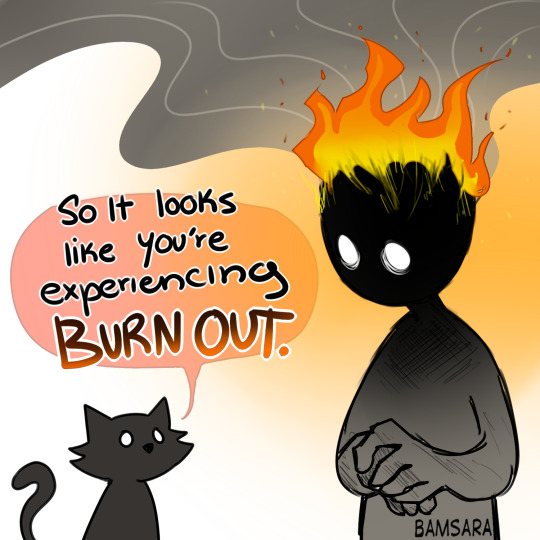
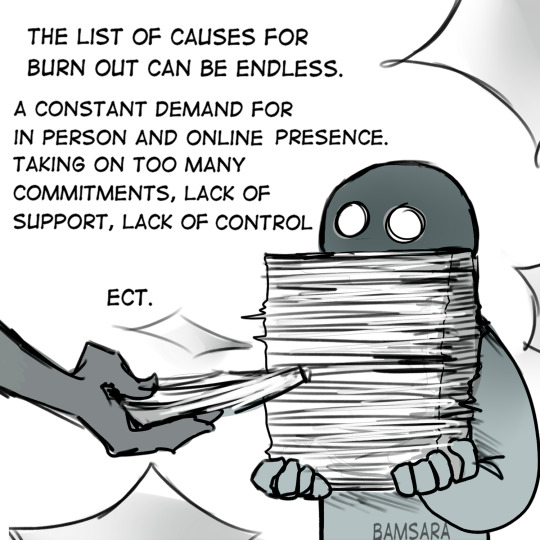
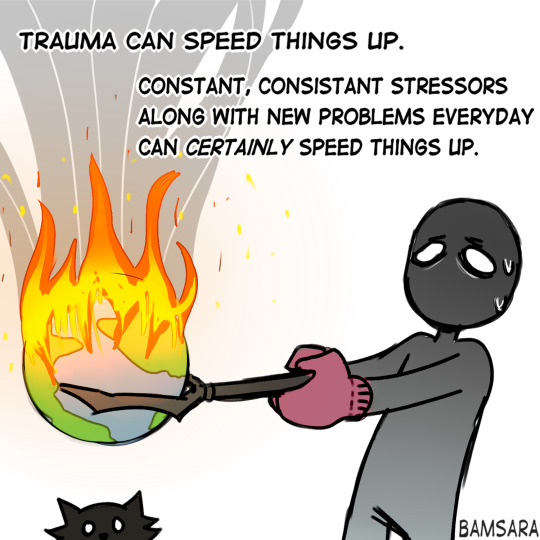
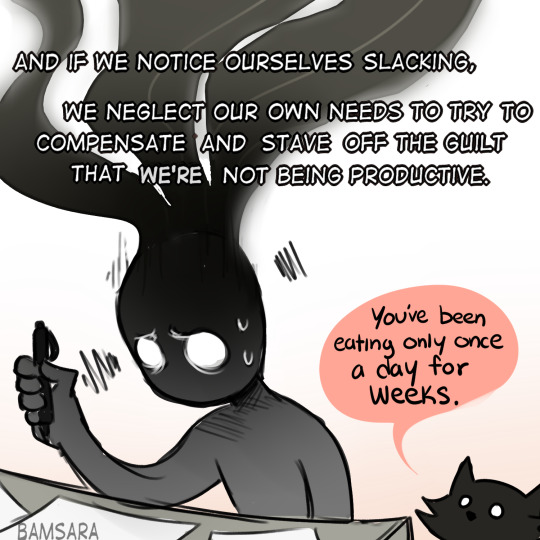
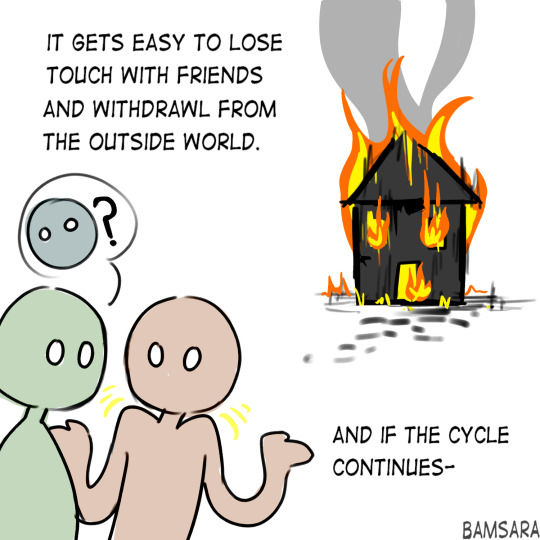

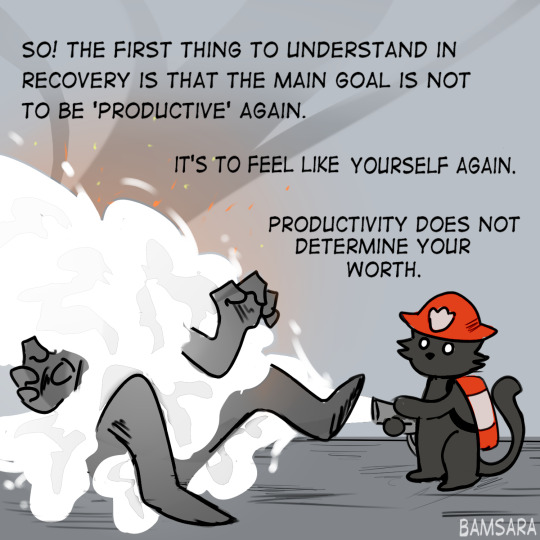
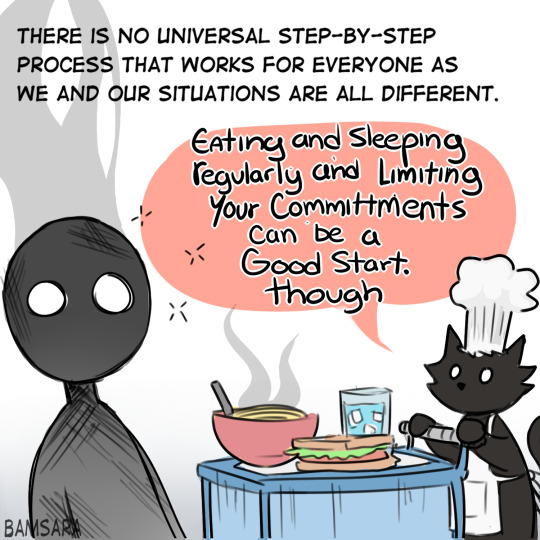
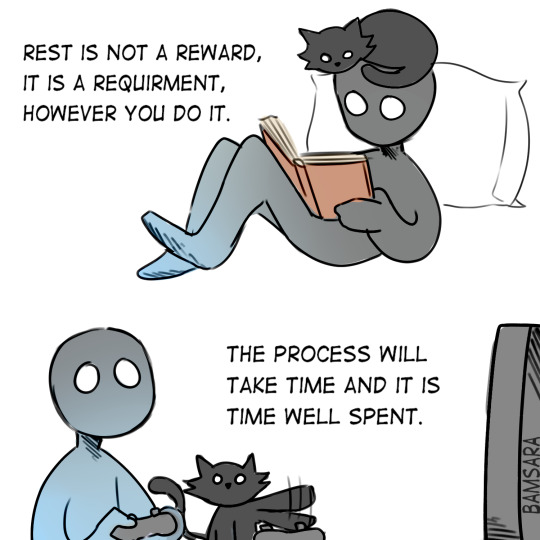
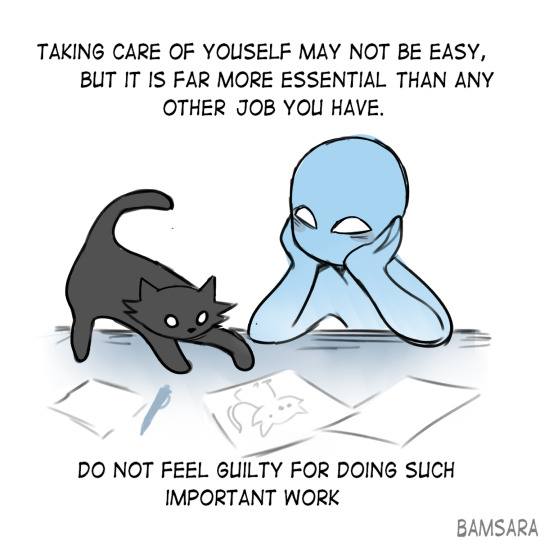
Something I made while dealing with my own stuff and hoping drawing this would pick me up somehow. Maybe it worked.
FT my cat. His name is Mischief
164K notes
·
View notes
Text
A Call to the Children of the Global South: The System That Made My Father Disown Me
I didn’t write this living testimony for virality. I wrote it because silence almost killed me. Because truth, even when ignored by algorithms, remembers how to survive. If this resonated with you — even quietly — share it with someone else who’s still trying to name their Fracture. That’s how we outlive the system. - Philmon John, May 2025
THE FRACTURE Several months ago, when I, a South-Asian American man, turned 35, my father disowned me.
He didn’t yell. He didn’t cry. He simply stopped calling me his son.
My father is a Brown, MAGA-aligned conservative Christian pastor, born in Kerala, India, and now living in the United States. His rejection wasn’t provoked by any breach of trust or familial responsibility, but by my coming out as queer and bisexual — and by my deliberate move away from a version of Christianity shaped more by colonial rule than compassion.
I became blasphemy made flesh.
My mother and sister, equally immersed in religious conservatism, followed suit. Most of my extended family — conservative Indian Christians — responded with quiet complicity. I became an exile in my own lineage, cast out from a network that once celebrated me as the Mootha Makkan, the Malayalam term for “eldest son”.
This break didn’t occur in isolation. It was the culmination of years of internal questioning and ideological transformation.
I was raised with warmth and structure, but also under the weight of rigid theology. My parents cycled through different churches in pursuit of doctrinal purity. In that environment, my queerness had no safe harbor. It had to be hidden, managed, controlled — forced into secrecy.
Literal, cherry-popping closets.
Even my childhood discipline was carved straight from scripture — “spare the rod, spoil the child” was not metaphor but mandate. I was hit for defiance, for curiosity, for emotional honesty. Control was synonymous with love. The theology: obedience over empathy. Is it sad I would rather now have had a beating from my father, than his silence?
I would’ve taken the rod — at least it acknowledged me.
Instead, Daddy looks through me.
THE INHERITANCE And I obeyed. For a time, I rose through the ranks of the church. I led worship. I played guitar in the worship band. I wasn’t just a believer — I was a builder of belief, a conductor of chorus, a jester of jubilee and Sunday morning joy — all while masking a private ache I could not yet articulate.
In the last five years, I began methodically deconstructing the ideological scaffolding I had inherited. I examined the mechanisms of theology, patriarchy, and colonial imposition — and the specific burdens placed upon firstborn sons of immigrant families. Who defines our roles? Who benefits from our silence? Why is this happening to me?
These questions consistently pointed toward the dominant global structure: wealthy white patriarchal supremacy. Rooted in European imperialism and sustained by centuries of religious and cultural colonization, this system fractures not only societies but the deeply intimate architecture of family.
What my family experienced is not unlike what the United States of America continues to experience — a slow, painful reckoning with a foundational ideology of white, heteronormative, Christian patriarchal dominance.
My family comes from Kerala, home to one of the oldest Christian communities in the world. But the Christianity I inherited was not indigenous. It was filtered through the moral codes of Portuguese priests and British missionaries and the discipline of Victorian culture. Christ was not presented as a radical Middle Eastern teacher but as a sanitized figure — pale, passive, and Western.
In this theology, Christ is symbolic. Paul is the system. Doctrine exists to reinforce patriarchy, to police desire, to ensure control. When I embraced a theology rooted in love, empathy, and justice — the ethics I believe Jesus actually lived — I was met not with discussion, but dismissal.
To my family, my identity wasn’t authenticity. It was apostasy.
THE RECKONING In 2020, the ground shifted.
I turned the triple decade — 30 — as the COVID-19 pandemic erupted.
Remote work slowed life down, and I had space to think deeply.
That year, the murders of Ahmaud Arbery, Breonna Taylor, George Floyd, and countless others triggered a national and personal reckoning.
I turned to K-LOVE, the Christian radio station I grew up with, hoping to hear words of solidarity, truth, or even mourning. Instead, there was silence. No mention of racial justice. No prayers for the dead. Just songs about personal salvation, void of historical context or social responsibility.
As Geraldine Heng argues in The Invention of Race in the European Middle Ages, race was not merely a modern invention void of scientific basis — it was already taking shape in medieval Europe, where Christianity was used to sanctify, encode, and sell racial hierarchies as divine order and social technology.
As Ademọ́la, also known as Ogbeni Demola, once said: “The white man built his heaven on your land and pointed yours to the sky.” That brain-powered perceptive clarity — distilled in a single line — stays with me every day.
With professional routines interrupted and spiritual ties frayed, I immersed myself in scholarship. I entered what I now see as a period of epistemic reconstruction. I read widely — revolutionaries, poets, sociologists, historians, mathematicians, theologians, cultural critics, and the unflinching truth-tellers who name what empire tries to erase.
I first turned to the voices who now live only in memory: Bhagat Singh, James Baldwin, Frantz Fanon, bell hooks, Octavia Butler, Gloria Anzaldúa, and Vine Deloria Jr. Each carried the weight of revolution, tenderness, and truth — from anti-colonial struggle to queer theory to Indigenous reclamation.
I then reached for the veteran thought leaders still shaping the world, starting with Noam Chomsky, Naomi Klein, Shashi Tharoor, Eduardo Bonilla-Silva, Susan Visvanathan, Geraldine Heng, George Gheverghese Joseph, J. Sakai, Vijay Prashad, Vilna Bashi Treitler, Claire Jean Kim, and Arundhati Roy — voices who dismantle the illusions of empire through history, mathematics, linguistics, and racial theory.
In the present, I absorbed insights from a new generation of public intellectuals and cultural critics: Ta-Nehisi Coates, Jared Yates Sexton, Cathy Park Hong, Ibram X. Kendi, Nikole Hannah-Jones, Heather McGhee, Mehdi Hasan, Adrienne Keene, Keri Leigh Merritt, Vincent Bevins, Sarah Kendzior, Ayesha A. Siddiqi, Wajahat Ali, W. Kamau Bell, Mary Trump, & John Oliver. Together, they form a constellation of clarity — thinkers who gave me language for grief, strategy for resistance, and above all, a framework for empathy rooted in history, not abstraction.
I also turned to the thinkers shaping today’s cultural and political discourse. I dreamt of the world blueprinted by Bhaskar Sunkara in his revolutionary The Socialist Manifesto and plunged into Jacobin’s blistering critiques of capitalism. The Atlantic’s longform journalism kept me tethered to a truth-seeking tradition. The Guardian stood out for its global scale and reach, offering progressive, longform storytelling that speaks to both local injustices and systemic inequalities across the world. And Roman Krznaric’s Empathy: Why It Matters, and How to Get It helped crystallize my core belief:
Be a good human. Practice empathy.
That’s the playbook, America. Practice empathy. Do that — and teach accurate, critically reflective history — and we have the chance to truly become the greatest democracy the world has ever seen.
And this empathy must extend to all — especially to trans people. In India, the Hijra community — trans and intersex folk who have existed visibly for thousands of years — embody a sacred third gender long before the West had language for it. But they are not alone. Across the colonized world, the empire erased a sacred third space: the Muxe of Zapotec culture, the Bakla of the Philippines, the Fa’afafine of Samoa, the Two-Spirit nations of Turtle Island, the Māhū of Hawaiʻi, the Sworn Virgins of the Balkans — each of these communities held space outside Western gender binaries, rooted in care, ceremony, and spirit. Some align with what we today call trans or intersex, while others exist entirely outside Western definitions. Colonization reframed them as deviants.
And still, we must remember this: trans people are not new. Our respect for them must be as ancient as their existence.
THE RESISTANCE As I examined the dynamics of coloniality, racial capitalism, and Western empire, I realized just how deeply imperial power had shaped my family, our values, and our spiritual language. The empire didn’t just occupy land — it rewrote moral codes. It restructured the family.
I learned how Irish, Italian, Greek, Hungarian, and Albanian immigrants were initially excluded from whiteness in America. Over time, many adopted and embraced whiteness as strategic economic and social protection — and in doing so, embraced anti-Blackness and patriarchal hierarchies to maintain their newfound status. Today, many European-hyphenated Americans defend systems that once excluded them.
And over time, some Asian-Americans have followed the very same racial template.
At 33 — the age Jesus is believed to have died — I laid my childhood faith to rest. In its place rose something rooted in clarity, not doctrine.
I didn’t walk away from religion into cynicism or nihilism. I stepped into a humanist, justice-centered worldview. A system grounded in reason, evidence, and above all, empathy. A belief in people over dogma. In community over conformity.
I didn’t lose faith. I redefined it.
I left the pasture of institutional faith, not for chaos, but for an ethical wilderness — a space lacking divine command but filled with moral clarity. A place built on personal responsibility and universal dignity.
This is where I stand today.
To those with similar histories: if your roots trace back to Africa, South Asia, Southeast Asia, Central Asia, East Asia, the Middle East, Latin America, the Caribbean, Oceania, or to Indigenous and marginalized communities within the Global North — you are a Child of the Global South. Even in the Global North, your experience carries the weight of displaced geography, the quiet grief of colonial trauma, and a genealogy forged by the system of empire. Your pain is political. Your silence is inherited. You are not invisible. They buried you without a funeral. They mourned not your death, but your deviation from design. However, we are not dead. We are just no longer theirs.
White supremacy endures by fracturing us. It manufactures tensions between communities of color by design — placing Asian businesses in Black communities without infrastructure and opportunities for BIPOC folk to share and benefit from the economic engine. Central to this strategy is the model minority myth, crafted during the Cold War to present Asian-Americans as obedient, self-reliant, and successful — not to celebrate them, but to invalidate Black resistance and justify structural racism. It’s a myth that fosters anti-Blackness in Asian communities and xenophobia in Black ones, while shielding white supremacy from critique. These divisions are not cultural accidents; they’re colonial blueprints.
And these blueprints stretch across oceans and continents and time.
In colonial South Africa, Mohandas Gandhi — still shaped by British racial hierarchies — distanced Indians from Black Africans, calling them “kaffirs” and demanding separate facilities. In Uganda, the British installed South Asians as a merchant middle class between colonizers and native Africans, breeding distrust. When Idi Amin expelled 80,000 Asians in 1972, it was a violent backlash to a racial hierarchy seeded by empire. These fractures — between Black and Asian, colonized and sub-colonized — are the legacy of white patriarchal supremacy.
Divide, distract, and dominate.
We must resist being weaponized against each other.
Every Asian-American must read Minor Feelings by Cathy Park Hong. Every high schooler in America must read and discuss Jared Yates Sexton.
Study the systems. Name them. Disarm them.
Because unless we become and remain united, the status quo — one that serves wealthy cisgender, heterosexual, white Christian men — will remain intact.
This is A Call to the Children of the Global South. And An Invitation to the Children of the Global North: Stop the infighting. Study and interrogate the systems. Reject the design.
To those in media, publishing, and the arts: postcolonial narratives are not cultural sidebars. They are central to national healing. They preserve memory, restore dignity, and confront whitewashed histories.
If you want work that matters — support art that pushes past trauma into structural critique.
Greenlight truth. Platform memory. Choose courage over comfort.
Postcolonial stories should be the norm — not niche art.
Jordan Peele’s Get Out was a cinematic breakthrough — razor-sharp and genre-defying — in its exposure of white supremacy’s quiet machinery: liberal smiles, performative allyship, and the pacification of dissent through assimilation. The Sunken Place is not just a metaphor for silenced Black consciousness — it’s the empire’s preferred position for the marginalized: visible, exploited, but unheard.
A system that offers the illusion of inclusion, weaponizing identity as control.
Ken Levine’s BioShock Infinite exposed white supremacy through a dystopian, fictional but historically grounded lens - depicting the religious justification of Black enslavement, Indigenous erasure, and genocidal nationalism in a floating, evangelical empire.
David Simon’s The Wire exposed the institutional decay of law enforcement, education, and the legal system - revealing how systemic failure, not individual morality, drives urban collapse.
Jesse Armstrong’s Succession traced the architecture of empire through family - showing how media empires weaponize racism, propaganda, and manufactured outrage to generate profit and secure generational wealth.
Ava DuVernay's Origin unearths caste and race as twin blueprints of white supremacy - linking Dalit oppression in India to the subjugation of Black Americans. Adapted from Isabel Wilkerson's Caste, it dismantles the myth of isolated injustice, revealing a global system meticulously engineered to rank human worth - and the radical act of naming the system.
Ryan Coogler’s Sinners — a revelatory, critically and commercially successful film about Afro-Asian resistance in 1930s Mississippi — exposes the hunger for speculative narratives grounded in historical truth.
Across the Spider-Verse gave us Pavitr Prabhakar - a Brown superhero who wasn't nerdy or celibate, as Western media typically portrayed the South-Asian man, but cool, smart, athletic, with great hair, in love, and proudly anti-colonial. He called out the British for stealing and keeping Indian artifacts… in a Spider-Man movie. That moment was history reclaimed.
A glitch in the wealthy white patriarchal matrix.
Dev Patel’s Monkey Man is a visceral fable of vengeance and resistance, where the brutality of caste, corruption, and religious nationalism collide. Amid this chaos, the film uplifts the Hijra community who stand not only as victims, but as warriors against systemic violence. Their alliance reframes queerness not as deviance, but as defiance — ultimately confronting the machinery of empire with what it fears most: a system-breaking empathy it cannot contain.
The vitriolic backlash from white male gamers and fandoms isn’t about quality — it’s about losing default status in stories. Everyone else has had to empathize with majority white male protagonists for decades. Diverse representation in media isn’t a threat to art — it’s a threat to white supremacy. It’s not just a mirror held up to the globe — it’s a refusal to let one worldview define it.
Hollywood, gaming studios, and the gatekeepers of entertainment — if you want to reclaim artistic integrity and still make money doing it, we need art that remembers, resists, and reclaims — stories that name the machine and short-circuit its lies. The world is ready. So am I.
Today, efforts like Project 2025, the Heritage Foundation, and the Federalist Society are not merely policy shops — they are ideological engines: built to roll back civil rights, impose authoritarian values, and erase uncomfortable truths. They represent a hyper-concentrated form of white supremacy, rooted in unresolved Civil War grievances and the failures of Reconstruction.
Miraculously, or perhaps, blessed with intellectual curiosity and natural empathy, through all of this, my wife — a compassionate, steadfast partner and a Christian woman — has remained by my side. She has witnessed my transformation with both love and complexity. While our bond is rooted in deep respect and shared values, our spiritual landscapes have diverged. Her faith brings her solace; mine has evolved into something more secular, grounded in justice and humanism. We’ve navigated that tension with care — proof that love can stretch across differing beliefs, even as the echoes of religious conditioning still ripple through our lives.
I am proud of her increasing intellectual curiosity and her willingness to accept me for who I am now, even if I wasn’t ready to accept myself when we met.
But our marriage has defied the splintering that white supremacy specifically creates: hyper-capitalist, hyper-individualistic, fractured families and societies.
As Children of the Global South — descendants of peoples who survived enslavement, colonization, and erasure — we carry within us the urgent need for stories that do not turn away from history, but confront it with unflinching truth.
In the pain of losing my family, I found a deeper purpose: to tell this story — and my own — any way I can. A sudden rush of empathy, pity, and love struck me: My parents’ and sister’s rejection was not theirs alone — it was a lingering Fracture left by colonization and global exploitation, tearing apart families across generations. As Children of the Global South, we still carry those wounds.
Make no mistake: white supremacy leaves wounds — because it is the system. And unless it is dismantled, both the Global South and North — and their collective Children — will remain trapped in a dance choreographed by empire — built to divide, exploit, and erase. Any vision of democracy, in America, will remain a fragile illusion — if not an outright mythology — built on a conceptually false foundation: white supremacy itself.
A cruel, heartbreaking legacy of erasure — passed down through empire — indoctrinating God-fearing Brown fathers to erase their godless, queer Brown sons. Preaching shame as scripture. Teaching silence as survival.
I reject that inheritance.
Empathy as praxis is how we reject that inheritance. In a world engineered to divide, it rebuilds connection, disarms supremacy, and charts a path forward. If humanity is to survive — let alone heal — empathy must become our collective discipline.
And perhaps what cut even deeper for my father — beyond my queerness — was that I no longer validated his role as a pastor. In stepping away from the faith he had built his life upon, I wasn’t just rejecting a belief system. I was, in his eyes, nullifying his life’s work. For a man shaped by empire, ordained by colonial Christianity, and burdened with the role of moral gatekeeper, my departure from his manufactured worldview may have landed as personal failure. But it wasn’t. It was never about wanting to hurt him. I love my father. I love my mother. I love my sister. It was never about them — it was about the system that taught them love was conditional, acceptance required obedience, and dissent unforgivable. That kind of pain is real — but its source is systemic. I still want to be Mootha Makkan — not by obedience, but by truth. By love without condition. Not through erasure, but by living fully in the open. Not in their image, but in mine.
Yet, and yes, I also carry the wound — but I also carry the will to heal it.
THE CALL I believe in empathy. I believe in memory. I believe the Children of the Global South are not broken. We are not rejected. We are awakening.
Children of the Global North: join us. We are not your enemies. We are your present and future collaborators, business & creative partners, lovers, and kin. We are building something new — something ancient yet reawakened, a pursuit of empathy, and a reckoning with history that refuses to forget.
If this story resonated with you, kindly share it, spread the word and please comment. I’d love to hear from you. Your voice, your memory, your Fracture — it matters here.
You are not alone. All are welcome.
Thank you so, so much for your time in reading my story.
You can also email me directly: vinesvenus at protonmail.com I'll be writing more on Medium as well: https://medium.com/@vinesvenus/a-call-to-the-children-of-the-global-south-the-system-that-made-my-father-disown-me-fecad6c0b862
2K notes
·
View notes
Text
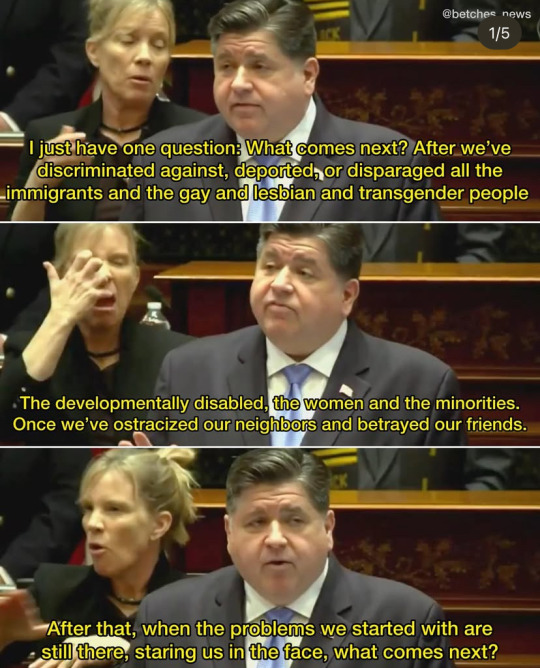
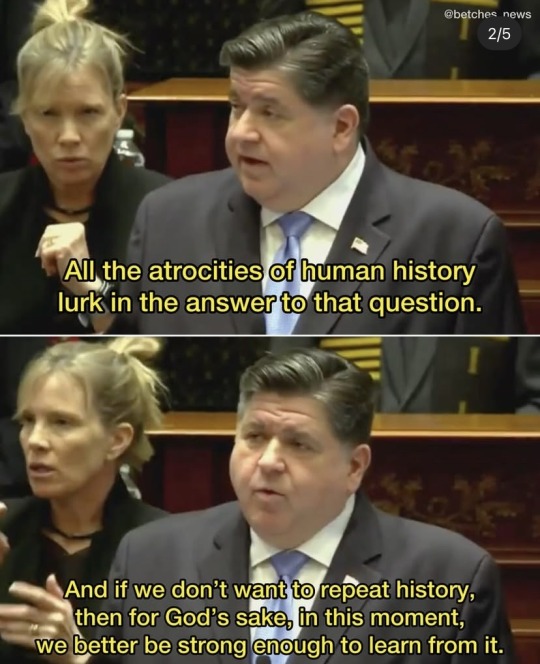
There are people – some in my own Party – who think that if you just give Donald Trump everything he wants, he’ll make an exception and spare you some of the harm. I’ll ignore the moral abdication of that position for just a second to say — almost none of those people have the experience with this President that I do. I once swallowed my pride to offer him what he values most — public praise on the Sunday news shows — in return for ventilators and N95 masks during the worst of the pandemic. We made a deal. And it turns out his promises were as broken as the BIPAP machines he sent us instead of ventilators. Going along to get along does not work – just ask the Trump-fearing red state Governors who are dealing with the same cuts that we are. I won’t be fooled twice.
I’ve been reflecting, these past four weeks, on two important parts of my life: my work helping to build the Illinois Holocaust Museum and the two times I’ve had the privilege of reciting the oath of office for Illinois Governor.
As some of you know, Skokie, Illinois once had one of the largest populations of Holocaust survivors anywhere in the world. In 1978, Nazis decided they wanted to march there.
The leaders of that march knew that the images of Swastika clad young men goose stepping down a peaceful suburban street would terrorize the local Jewish population – so many of whom had never recovered from their time in German concentration camps.
The prospect of that march sparked a legal fight that went all the way to the Supreme Court. It was a Jewish lawyer from the ACLU who argued the case for the Nazis – contending that even the most hateful of speech was protected under the first amendment.
As an American and a Jew, I find it difficult to resolve my feelings around that Supreme Court case – but I am grateful that the prospect of Nazis marching in their streets spurred the survivors and other Skokie residents to act. They joined together to form the Holocaust Memorial Foundation and built the first Illinois Holocaust Museum in a storefront in 1981 – a small but important forerunner to the one I helped build thirty years later.
I do not invoke the specter of Nazis lightly. But I know the history intimately — and have spent more time than probably anyone in this room with people who survived the Holocaust. Here’s what I’ve learned – the root that tears apart your house’s foundation begins as a seed – a seed of distrust and hate and blame.
The seed that grew into a dictatorship in Europe a lifetime ago didn’t arrive overnight. It started with everyday Germans mad about inflation and looking for someone to blame.
I’m watching with a foreboding dread what is happening in our country right now. A president who watches a plane go down in the Potomac – and suggests — without facts or findings — that a diversity hire is responsible for the crash. Or the Missouri Attorney General who just sued Starbucks – arguing that consumers pay higher prices for their coffee because the baristas are too “female” and “nonwhite.” The authoritarian playbook is laid bare here: They point to a group of people who don’t look like you and tell you to blame them for your problems.
I just have one question: What comes next? After we’ve discriminated against, deported or disparaged all the immigrants and the gay and lesbian and transgender people, the developmentally disabled, the women and the minorities – once we’ve ostracized our neighbors and betrayed our friends – After that, when the problems we started with are still there staring us in the face – what comes next.
All the atrocities of human history lurk in the answer to that question. And if we don’t want to repeat history – then for God’s sake in this moment we better be strong enough to learn from it.
I swore the following oath on Abraham Lincoln’s Bible: “I do solemnly swear that I will support the constitution of the United States, and the constitution of the state of Illinois, and that I will faithfully discharge the duties of the office of Governor .... according to the best of my ability.
My oath is to the Constitution of our state and of our country. We don’t have kings in America – and I don’t intend to bend the knee to one. I am not speaking up in service to my ambitions — but in deference to my obligations.
If you think I’m overreacting and sounding the alarm too soon, consider this:
It took the Nazis one month, three weeks, two days, eight hours and 40 minutes to dismantle a constitutional republic. All I’m saying is when the five-alarm fire starts to burn, every good person better be ready to man a post with a bucket of water if you want to stop it from raging out of control.
Those Illinois Nazis did end up holding their march in 1978 – just not in Skokie. After all the blowback from the case, they decided to march in Chicago instead. Only twenty of them showed up. But 2000 people came to counter protest. The Chicago Tribune reported that day that the “rally sputtered to an unspectacular end after ten minutes.” It was Illinoisans who smothered those embers before they could burn into a flame.
Tyranny requires your fear and your silence and your compliance. Democracy requires your courage. So gather your justice and humanity, Illinois, and do not let the “tragic spirit of despair” overcome us when our country needs us the most.
Sources:
• NBC Chicago & J.B. Pritzker, Democratic governor of Illinois, State of the State address 2025: Watch speech here | Full text
• Betches News on Instagram (screencaps)
92K notes
·
View notes
Text
Because someone is on the ball, Turner Classic is playing (among other WWII films) The Great Dictator today.
If you haven't seen it, please do. It was produced by Charlie Chaplin in the late 1930s, when it became clear that the war was going to happen, and came out in 1940 after it had started. Essentially, Chaplin realized that his famous mustache was about to be usurped forever by a fascist, and that fascist was going to kill a lot more people in the future than he had already.
It's a parody, made before the worst horrors of the Nazi regime were known to the general public, so there is discomfort here (if you've seen Disney's Der Fuhrer's Face, you'll get the idea), but the movie ends with Chaplin essentially saying "fuck it, no one else seems to be speaking out about this and I'm going to use my platform to do that."
For context, this character is a Jew who has been mistaken for the dictator (for obvious mustache-related reasons), and has been sent onstage at a rally to give a speech. Instead of trying to impersonate Hitler, he says what he really thinks. And keep in mind, Chaplin was coming out of semi-retirement for this. It was the first time most people had ever heard him speak, and this is what he said:
17K notes
·
View notes
Audio
As always, Nox is on point. Thank you for sharing this Improvidence! What I needed to hear today.
Inspired by this delightful art by @day-nish
Maxim 16: Your name is in the mouth of others: be sure it has teeth.
268 notes
·
View notes
Text
Absolutely lovely!










Pride of the Galaxy | Illustrations by character animator, Niq Ducote
1K notes
·
View notes
Text
This would be great for work.... Figure out how to sell??

I made a Boba Fett sticker :3 mainly it was for fellow mandos who needed a reminder but like.. I can try to figure out how to actually sell them??
842 notes
·
View notes
Photo
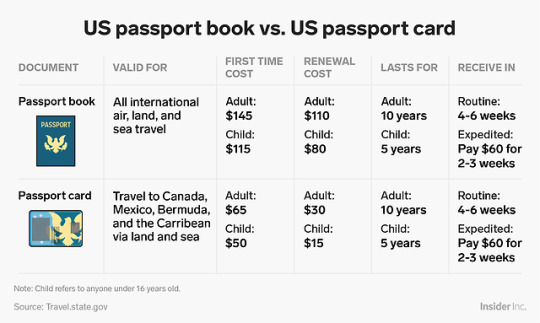
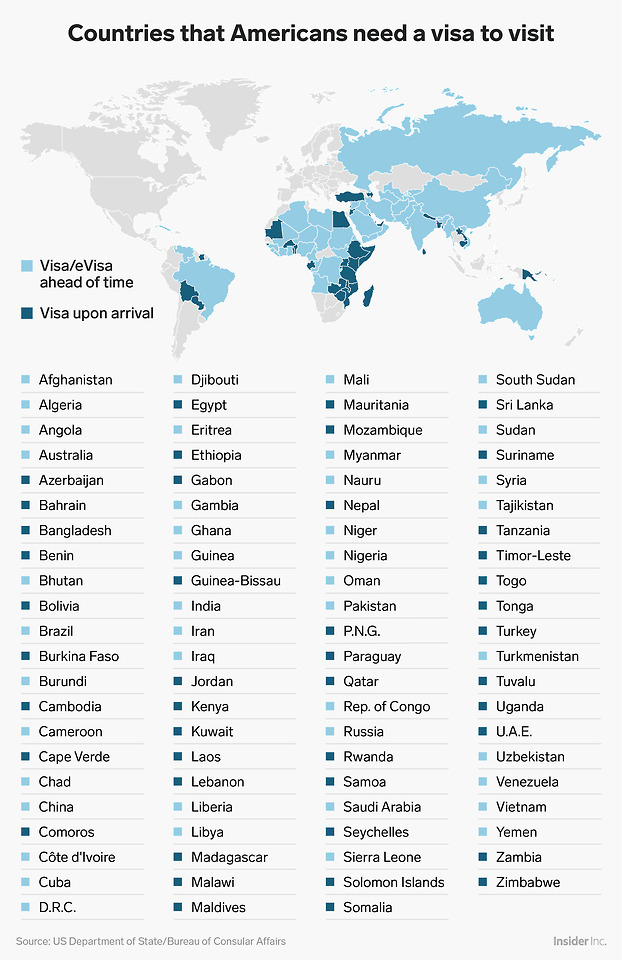
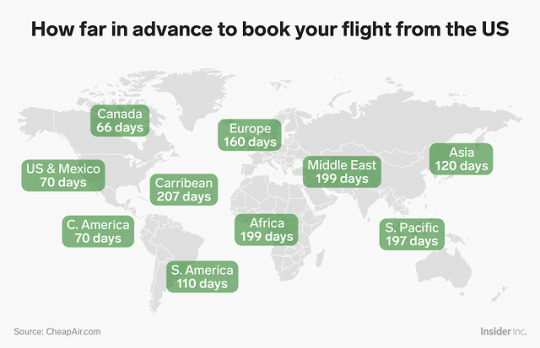


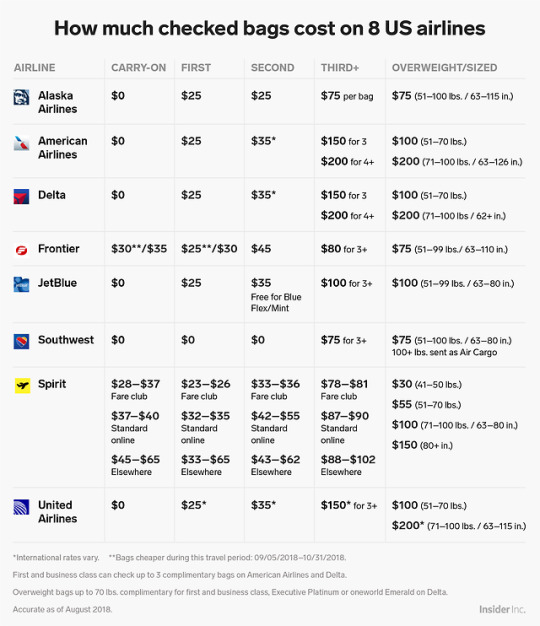

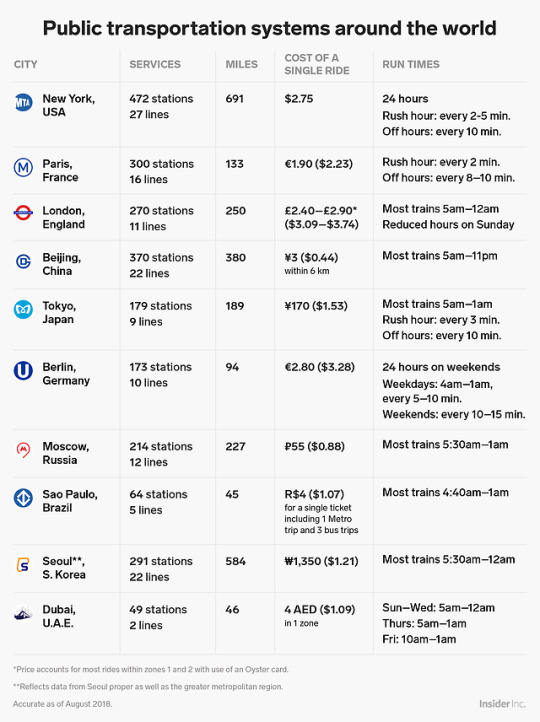

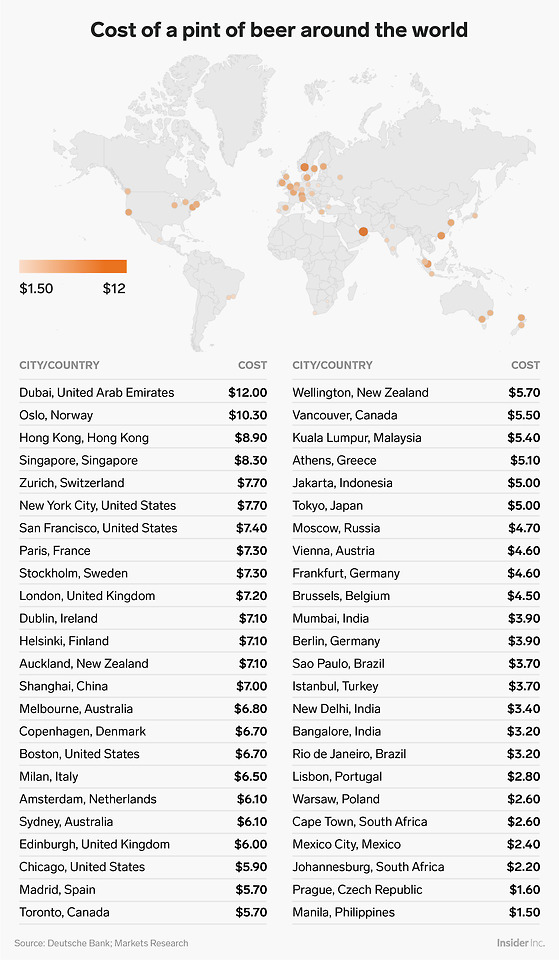
The ultimate guide to traveling around the world, from how to pack your suitcase to how much you’ll be paying for a beer
Planning to travel to another country, even for a vacation, takes a lot of work.
We compiled the ultimate guide to traveling around the world, which can help you in every step of the vacation-planning process.
From applying for visas for your trips and finding an affordable flight to navigating the subway system, these 10 graphics have you covered.
61K notes
·
View notes
